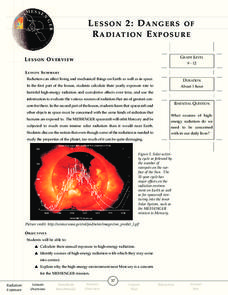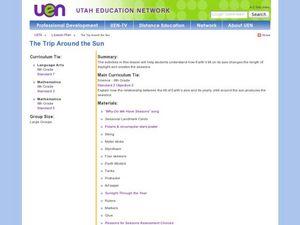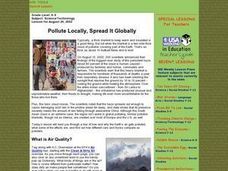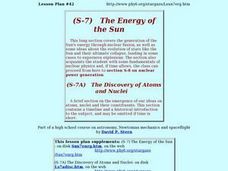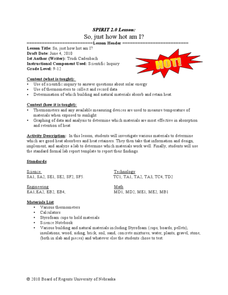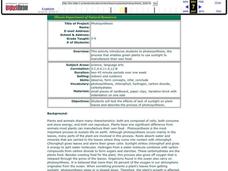Curated OER
Reasons for Seasons
Learners investigate a model of the tilt of the Earth in its relationship to the Sun during the different seasons of the year. They study the solstices and equinoxes, while determining how sunlight hits the Earth with different angles in...
Curated OER
Globe Lesson 11 - Rotation of the Earth - Grade 6+
In this rotation of the Earth worksheet, students read a 2-page review of the rotation of the earth and respond to 10 short answer questions.
NOAA
Exploring Potential Human Impacts
Arctic sea ice reflects 80 percent of sunlight, striking it back into space; with sea ice melting, the world's oceans become warmer, which furthers global warming. These activities explore how humans are impacting ecosystems around the...
Curated OER
Jackie Gore
Middle schoolers identify the amount of heat given off by solar energy. In this solar energy lesson, students complete an experiment using soil and sand measuring the heat from solar energy.
NASA
Dark Matter NASA Conference
Young scholars calculate the escape velocity of planets in our solar system and use that knowledge to calculate the escape velocity for NGC 2300 group. They then suggest reasons for the escape velocity to be higher than possible given...
Curated OER
(S-1) Sunlight and the Earth
Students discuss the solar heating of the Earth and atmosphere, its heat loss proceses, and the way these relate to weather and climate.
Curated OER
Bouncing Sunlight
Third graders use flashlights and balls to demonstrate how the light bounces off of the sun and reflects onto the moon. They record their observations in a journal.
Curated OER
Dangers Of Radiation Exposure
Students investigate the effects of radiation exposure and how it can effect objects on earth and space. They conduct research using a variety of resources and use the information to create a project that is reflective of good research...
Curated OER
Teaching the Complexities of Earth's Systems
An understanding of systems is integral to the study of the Earth.
Curated OER
Chilling Out
Learners determine the breakdown of worldwide energy consumption by various sources. After reading an article, they examine recent research in the area of alternative energy sources. Using the internet, they research the forms of...
Curated OER
Hello Sun, Goodnight Moon
Students become familiar with different times around the world through the reading of 9 O'clock Lullaby. In this Earth, sun, moon lesson, students recognize the movement of the Earth and the relationship to the sun and the moon. ...
Curated OER
The Trip Around the Sun
Sixth graders investigate the relationship between the tilt of the Earth's axis and the seasons. For this earth science lesson, 6th graders sing the song "Why Do We Have Seasons" and use simulate the Earth's tilt by using their bodies.
Curated OER
Pollute Locally, Spread It Globally
Students examine the rate of pollution throughout the world through an interactive program. They define air quality and the air quality index. They examine fuel economy and its impact on the Earth and renewable and nonrenewable resources.
Curated OER
The Energy of the Sun
Students study energy generation by the Sun, which involves atoms and nuclei.
NOAA
I Didn’t Do It…Did I?: Make Your Own Greenhouse Effect
How do greenhouse gases affect the climate on Earth? Pupils explore the concept by first building their own apparatuses to model the greenhouse effect. Then, they record data to measure temperature change and determine that the amount...
Consumers Energy
The Cost of Electricity
How much is your toaster costing you every day? Young environmentalists calculate the monetary costs of household appliances based on their average consumption of wattage.
Starry Night Education
The Year and Seasons
Turn your classroom into a live demonstration of how the earth and sun interact to create the four seasons. Using a globe, a light source, and a series of constellation cards, super scientists discover how the motion of these...
Curated OER
Good Vibrations Remote Sensing data Collection: Thermal Emission Spectrometer
The Mars Global Surveyor spent two years creating a mineral map of the planet Mars using thermal emission spectrometry. To help young astronomers understand this remote sensing instrument, have them simulate how data is collected and...
Curated OER
So, just how hot am I?
Students design a lab demonstrating the scientific method. In this earth science lesson, students investigate different materials for their heat absorbing property. They report their findings in class.
National Institute of Open Schooling
p-Block Elements and Their Compounds – II
Ozone, made of three bonded oxygen atoms, is found 15-30 km above Earth, has a strong smell, is blue, and blocks sunlight from hitting the surface of Earth. The 22nd lesson in a series of 36 specifically focuses on the important elements...
Curated OER
Sunlight and the Earth # T
Students learn that convection of heat in the atmosphere is the cause of weather phenomena. They learn that water vapor also carries solar heat and plays an important role in atmospheric convection.
Curated OER
Radiation Budget Lesson: Exploring Albedo
Students experiment with sunlight and temperature. They study the definition of albedo, or the percentage of incoming sunlight that is reflected, rather than absorbed.
Curated OER
Photosynthesis
Students are introduced to the process of photosynthesis. In groups, they test the effects of the lack of sunlight on plant leaves and compare the results with their hypothesis. They note the characteristics that plants and animals share...
Curated OER
Primary Activity: Dichotomous Key of Energy Sources
In this energy sources worksheet, students fill in a chart using a dichotomous key of energy sources. They use follow the directions and label items such as the sun, a windmill, and an oil rig with the proper number and letter labels...









